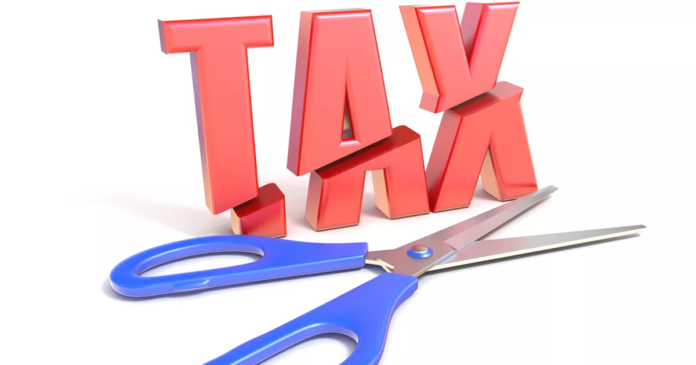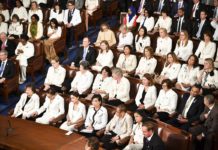Every once in a while I hear a lie so pernicious that it blows my mind that anyone would even be willing to tell it, much less to believe it, and it seems that one such lie is being used by the Democratic Party, with some success. This lie is that the American Worker is worse off under Trump’s tax cuts, than they would be without Trump’s tax cuts.
The truth is that 80% of everyone who paid taxes got a tax cut under Trump, and that most of those whose effective tax rates went up are rich. At the same time, while tax rates were cut, Americans are also making more money, and as such, more tax dollars are being collected than before. Millions of American families are making more money, and though they are paying more money in taxes, they are also paying a lower percentage of their total incomes in taxes.
To illustrate how someone who is paying more in taxes can be better off, allow me to draw an illustration. Let us say that someone made $50,000 before the Trump tax cuts, and paid a 20% effective tax rate in Federal income taxes. This person would have paid $10,000 in federal income taxes, and would have had an after-tax income of $40,000.
Let’s say that four years later, after Trump’s tax cuts, the same person has an effective tax rate of 15% (5% lower than before), but they now earn $75,000 per year. This person would now pay $11,250 in taxes, and have an after-tax income of $63,750.
There are a number of things you can claim about this person. One is that his or her taxes went up $1,250. Another is that their effective tax rate went down 5%. Another is that they are making 50% more money gross, and 63% more money after taxes are considered.
To believe that Trump’s tax cuts have hurt this person, one would have to believe that they were better off with $40,000, after taxes, than with $63,750, after taxes. This is absurd, and yet this is exactly the story Democrats are trying to tell.
To say that Trump’s tax cuts hurt this person is dishonest to the point of being a lie, and frankly, I’m almost embarrassed to have to write a blog post that essentially says that if you pay a smaller percentage of your income in taxes, you will pay less in taxes, UNLESS YOUR INCOME GOES UP!
The American worker is paying more in tax dollars than before, but that is not because their tax rates went up. It is because they are making more money.
Only a Democrat would try to spin that as being somehow bad.
Another thing on taxes Democrats like to leave out is that almost half of all working Americans pay no federal income tax at all. Many of these people actually get back more in ‘refunds’ than they pay in taxes, making their effective tax base negative. Under Barrack Obama the percentage of American paying no income tax was 40%, while under Trump it is up to 44%, thanks to a doubling of the standard deduction and an increase in child tax rebate. Democrats would have this 44% of Americans believe that they are worse off because of Trump’s tax cuts, which is a complete fabrication.
People like Paul Krugman call my position on taxes ‘naive’ and ‘simplistic.’ Paul Krugman points out that when government taxes money, it also spends that money, and that money spent into the economy has a ‘multiplier effect,’ such that one dollar taxed may become ten dollars in the economy.
Paul Krugman is correct that money spent by government has a ‘multiplier effect,’ but what Paul Krugman leaves out is that money not taxed out of the economy also gets spent. Even if someone invests money, the investment is a form of spending, putting the invested dollars into the economy where they can multiply.
In order for Paul Krugman’s ‘multiplier effect’ to work the way he says it does, government spending would have to have a higher ‘multiplier effect’ than does private spending. With private spending, we don’t call it a ‘multiplier effect,’ but rather we call it the ‘crowding out effect,’ which is to say that while Paul Krugman is busy measuring how much money government spending generates, other economists are instead measuring how much MORE money would be generated if Paul Krugman took his ideas and fell off a cliff.
There are four subjects I’ve studied a great deal. One is information technology. My bachelors is in IT, and I’ve spent most of my professional career in IT as well. Another area of study is Lean Manufacturing. I have a Masters of Business Administration, with an emphasis in Lean Manufacturing, and I’m but a few classes short of a Masters of Science in Lean Manufacturing. I use lean manufacturing techniques every day, applied to IT.
My third area of study is economics. I don’t have a degree in economics, but my MBA puts me in a position where I could, if I wanted to, go for a doctorate in economics. If I were younger, or if my blog grew to the point where a doctorate in economics could provide an economic benefit, I would go back to school and get one. I already know what my doctoral thesis would be…
My final area of study is history. My father was a history teacher, and he taught far more history at home than at school. I also inherited all of his history books, and I read them voraciously. When you add in all of the history (and economics) books I’ve purchased myself, it’s a lot…

The most important thing I have learned in all of these areas of study came from comparing them. IT and lean manufacturing operate in hard science. Different communications protocols, for example, have known differences that can be measured and compared. We can select the ‘best’ protocol based on a business’ needs, using purely objective research and data. The same is true in lean manufacturing. I can look at a complex process, learn it by working it manually, figure out it’s critical measurements, and then make changes, gauging whether or not each change is helpful based on the impact on the critical measurements within the system.
There are political implications behind history and economics, and to a lesser degree, behind business administration as well. As a result, while history itself is the study of what happened in the past, most of those who teach history pick and choose what happenings to use (and how to describe them), in order to support a particular political agenda. Economics is supposed to be the study of the production, consumption, and transfer of wealth, but economies are very complex, and as a result, most economists pick and choose what aspects of an economy to look at, and do so with political axes to grind.
Many people think they know a great deal about history and/or economics, when in reality they have glaring holes in their knowledge, intentionally left out to make them believe things that are not true.
In this case, the political axe is that notion that tax cuts are bad. The narrative behind this political axe is that working people have been harmed by Trump’s tax cuts. The data that supports this narrative is that working Americans are paying more in taxes than they were before, and the hole in the knowledge being delivered is that working Americans are only paying more in taxes because they are making more money than they were before.
People making more money than before is a good thing.
In spite of the fact that 80% of Americans have a lower tax burden than they did before, we are actually raising more tax revenue, thanks to a growing economy. That too is a good thing.
Good things are happening. We should celebrate.
Celebration of the economy, however, would tend to encourage people to re-elect Trump. The Democratic Party does not want Trump re-elected, and as a result, they only tell a part of the truth, and they lie by omission.
























